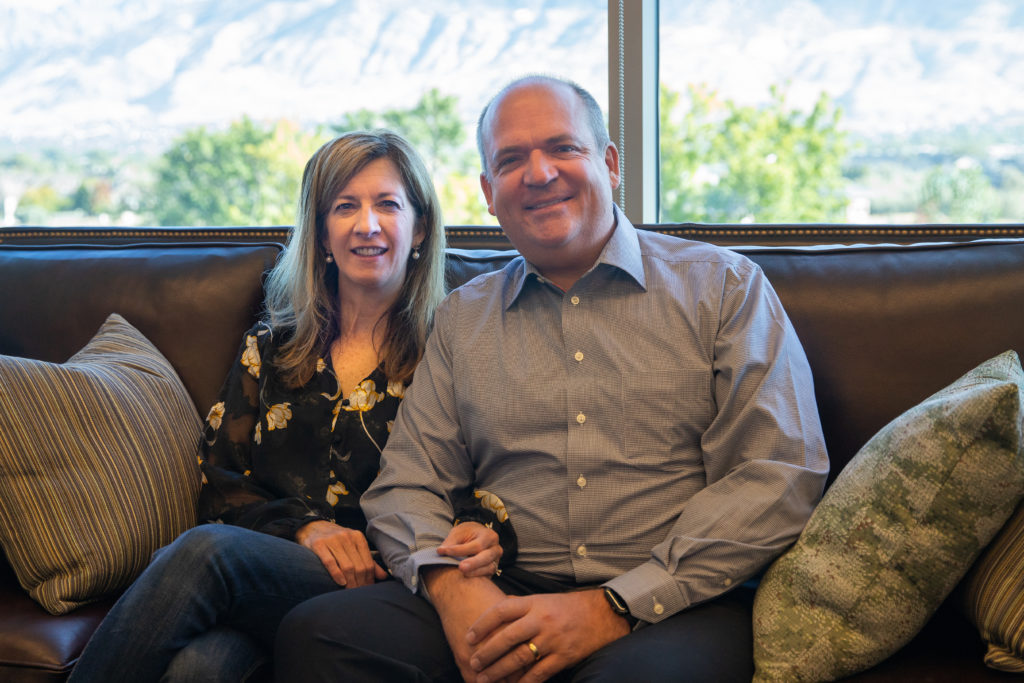
BYU alumni and DoTERRA co-founders Greg and Julie Cook were eager to help when they were approached by Intermountain Healthcare and presented with an opportunity to support the Utah suicide prevention campaign.
“We have designated suicide prevention as one of the central and pillar causes of our family,” Greg Cook said. “While we donate to many different causes to one degree or another, we have identified this one in particular, as one worth spending the rest of our lives in support of.”
Utah currently has one of the highest suicide rates in the nation. There have been 3,200 reported suicides in the past five years alone, according to Rep. Steve Eliason, R-Sandy. Suicide is also currently the leading cause of death for 10 to 24 year olds.
The Utah Legislature said it would appropriate $700,000 for a state-wide suicide prevention campaign if it was matched by public and private sector donations. An additional $300,000 from the general fund was available that did not require a match. The required amount, totaling $2 million, was recently raised, and according to Utah leaders, the campaign is set to launch sometime next year.
The Cook’s donated from their personal funds to help support the cause, which has personal significance to them.
Greg Cook was first impacted by the horrific reality of suicide when he served as a bishop in his ward and an 11-year-old boy in his congregation unexpectedly chose to end his life.
“At 11 years old, you don’t even know what you’re doing,” Cook said. “When a young boy takes his life with seemingly no warning or awareness, it brings to light how a mental disease is so subtle, hurtful and damaging.”
Shortly after the incident, the Cook’s were at the hospital consoling the young boy’s distraught mother. She was trying to contact her husband who was away on a business trip and had not yet heard the news.
“The husband finally returned the call and she couldn’t talk to him and tell him what happened. So she put me on the phone,” Greg Cook said. “That was one of the most difficult things I’ve ever done. Telling a father that his son has passed away in such an unexpected, tragic way.”
Julie Cook was a college student attending BYU when she lost an uncle to suicide.
“He was my favorite uncle, someone very close to me,” she said. “Many people who take their lives have no idea the impact that it has on so many others. I think if they realized how much heartache that suicide causes, they might not make that choice.”
It was a combination of their personal experiences, financial situation and recognition of the need for more mental health resources that prompted the Cook’s to support the campaign.
“We get to take part in this wonderful initiative with state leaders, other businesses and religious leaders,” Greg Cook said. When we see those levels of opportunity coming together, we see something great is about to happen. We will absolutely help in whatever way we can.”
The campaign will entail creating and promoting advertisements and educational content focused on suicide prevention and mental health awareness. The content will span across platforms like billboards, TV, print, radio and other outlets.
Benee Larsen is the prevention by design director for the National Alliance on Mental Illness in Utah. She said the purpose of the campaign is to encourage people to talk openly about suicide to combat the negative stigma it has in the community.
“Many people who have signs and symptoms of suicide or are thinking of suicide don’t seek help,” Larsen said. “Communicating that to our population and encouraging them to seek help and having family members, friends and neighbors know what to look for is key in enabling people to do something.”
According to Greg Cook, part of the reason why people don’t seek help is because they don’t know about the resources available to them.
“The reason people don’t seek out resources is because of lack of education, fears or underestimating the depth of the situation that is in front of them. We need to stop underestimating, to stop stigmatizing, to stop not caring,” Greg Cook said. “I would like to see suicides eradicated completely. The loss of one single life is incalculable.”
Julie Cook agrees. “For many, it’s a very solitary trial that isn’t talked about much. The hardest part is seeing close friends and others around you that are trying to get help for their kids, but can’t find the resources,” she said. “That’s one of the reasons we’re so passionate about this. It’s hard seeing people trying to get help, but not being able to get it because the resources are limited.”
Despite campaign support from the state legislature, The Church of Jesus Christ of Latter-day Saints and businesses, there are people who believe the campaign funds should be used for other mental health resources rather than using it to advertise suicide prevention and other resources on billboards.
According to Larsen, the campaign’s focus on education is one part in a layered effect of many other efforts.
“People are already focusing on providing mental health resources through other campaigns and efforts,” Larsen said. “This is just another way to address the problem.”
The Cook’s plan on communicating with Intermountain Healthcare in the future to discuss more specific plans that will extend beyond the awareness campaign.
“This is just the beginning of something that will be going on for years to come,” Greg Cook said. “We will keep going until we’ve done everything that we feel like we can do.”
If you, or someone you know, is struggling with thoughts of suicide, please call the National Suicide Prevention Lifeline at 1-800-273-8255.




